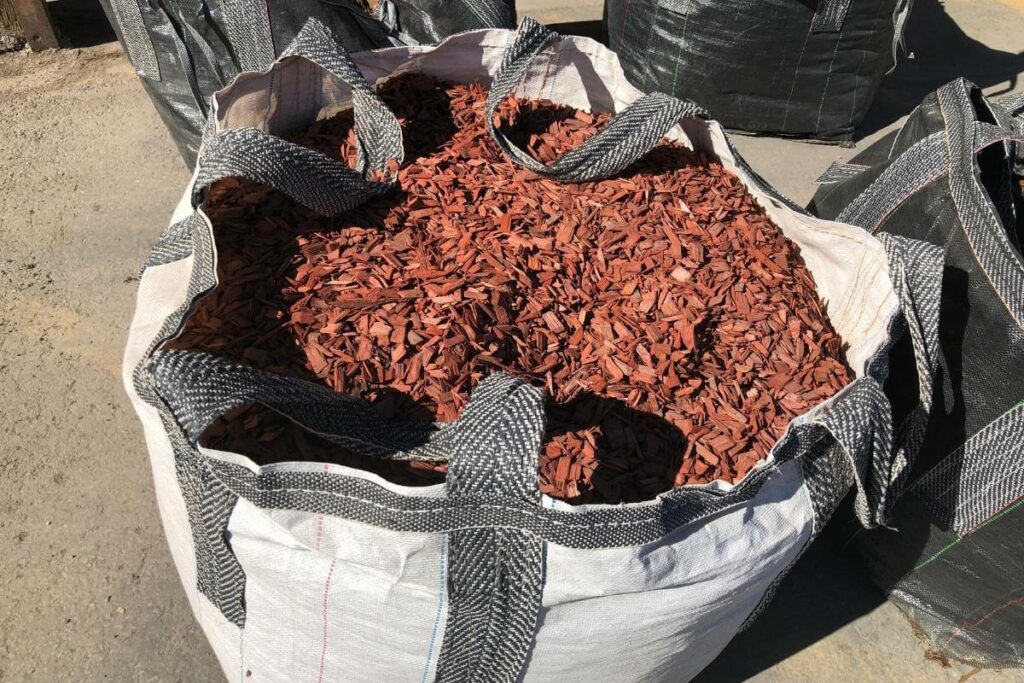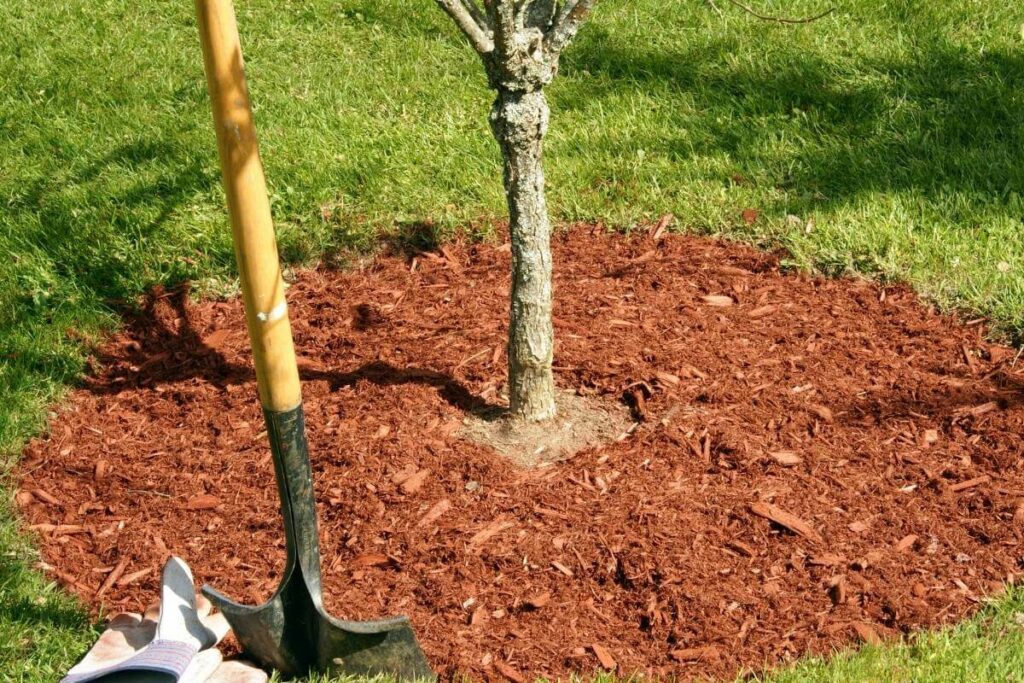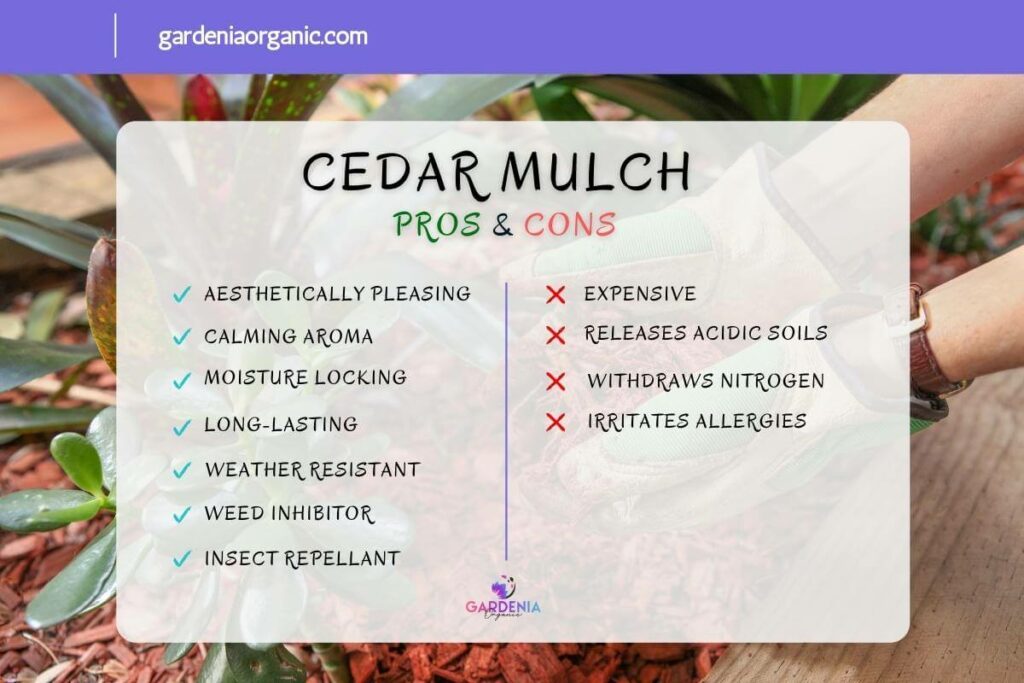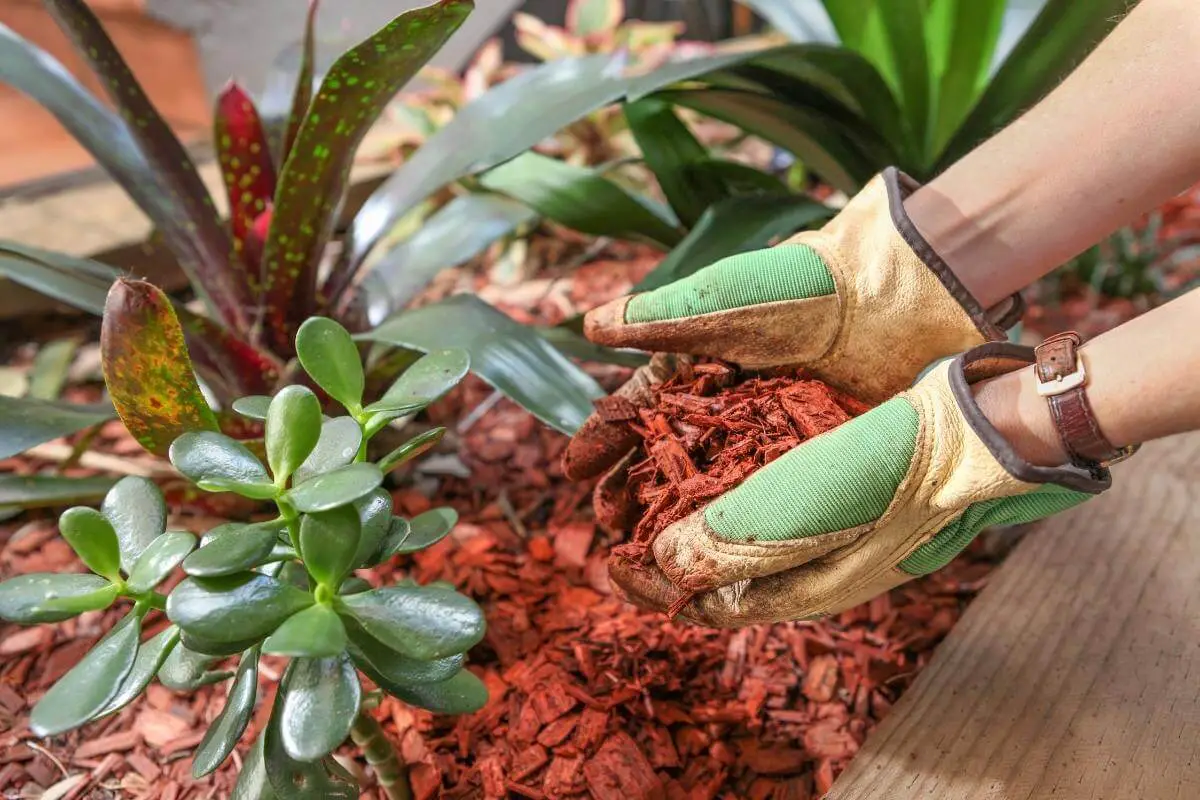To begin with, mulch is made of various organic materials that act as a protectant and a source of nutrients.
This organic material could be grass clippings, leaves, compost, or something else.
So, keep reading to learn all you need to know about types of cedar mulch and the pros and cons.
Types of Cedar Mulch
You can extract cedar mulch from three trees grown in the USA:
- northern cedar
- eastern cedar
- western red cedar
No matter which type of cedar you decide to go with, you’ll have to choose between these.

Shredded Cedar
Shredded cedar is the smallest of the three types.
Consequently, it’s lighter and easier to use, making it more suitable for delicate plants, flower beds, and tiny seedlings that the large particles of chippings might suffocate.
Cedar Chippings
Chippings are heavier and more robust.
Because of this they’re typically used with larger trees and broader areas. They are great for landscaping and protecting plants.
Painted and Natural Cedar
The choice between both relies on style and aesthetics.
Some prefer to use dyed mulch to create a particular atmosphere and tie the landscape elements together.
Others don’t have the same inclination and prefer to leave mother nature to do its thing.
They’re content with the color of cedar mulch as it decomposes, which leans towards shades of gray.
Generally, colored mulch isn’t toxic, as the dyes used, carbon-based or oxide-based, are harmless.
However, if you find the colored mulch you’re buying relatively cheap, you should reconsider it.
That’s because it could be recycled wood that has been dyed to look like cedar mulch.
In This Case: It’s possible that it can have the toxic chromated copper arsenate, which was banned in 2003.
How to Properly Place Cedar Mulch
In a Field
Our first golden rule is that every 10 ft.² of soil requires 2.5 ft.³ of cedar mulch.
And our second golden rule is that you have to keep your cedar mulch away from tree trunks and stems, as it retains water.
So, if it’s in constant contact with the stem/root of your plant, it’ll continuously give it excessive water, which can lead to the rotting of your plants from the inside.
Accordingly, to place cedar mulch in a field, take the following actions:
- Calculate the area.
- Buy your cedar mulch of choice.
- Once you’ve gotten your hands on your cedar mulch, you need to remove all weed and grass from your field.
- Make sure that it’s adequately irrigated.
- Start dropping your mulch on the wet soil so that it stands 3 inches above the ground.
- Try to make it as even as possible; don’t create puddles or low areas that trap water.
Around a Tree
If you have a planter or a bed with a single tree, and you want to make sure that it’s protected and well-fed.

You can do that by using the following steps:
- Take a good look at your tree and see how far its branches have extended.
- Find the tree’s longest branch.
- Extend a line from the tree to the soil.
- Repeat this process around your tree so that you’re able to draw a circle around it; this circle represents the extent of the tree’s roots.
- Take roughly one step away from the circle, and start putting mulch beyond this step.
Cedar Mulch Pros
Aesthetically Pleasing
Cedar mulch gives a vintage feel to your field.
It can create a beautiful color palette, especially if you choose to go with colored mulch.
Beneficial
Cedar mulch is beneficial, thanks to its calming aroma.
Plus, it helps people focus by isolating themselves from the outside world.
Moisture Locking
Mulch acts as a semi-barrier before the surface, locking in the moisture and allowing the soil to absorb it entirely.
The plants are also able to take their complete fills of H2O as well.
Long-Lasting
Cedar mulch takes its time with your soil.
It provides the soil with:
- sulfur
- magnesium
- phosphorus
- potassium
- nitrogen
- carbon
And it takes a while to decompose, thanks to thujaplicin, which is resistant to mold, fungus, and bacteria.
Protective From Extreme Weather Changes
When you have cedar mulch covering your soil, it prevents it from getting too warm in the summer and too cold in the winter.
It even can protect it from being tricked by sudden weather changes.

This includes things like unforeseen warm days in the middle of the winter, which can prompt the sudden growth of tiny seedlings.
The next day will bring back the extreme cold and knockout those delicate plants.
Weed Inhibitor and Insect Repellant
Before you add the cedar mulch to your soil, you must remove all weeds.
Then, the mulch will restrain the regrowth of weed by suffocating it.
Even Better: As for insects, it creates a barrier between your plant’s roots and the insects. Not to mention, cedarwood is known for its anti-bug properties.
Cedar Mulch Cons
Expensive
Cedarwood is expensive, so its mulch is costly as well.
Still, it requires less maintenance throughout the year and takes the burdens of insects, wind, rain, UV light rays, and bugs off your back.
These benefits alone make it worth it for many people.
Releases Acidic Soils and Withdraws Nitrogen
While cedar mulch is decomposing, it’s known to release acetic acid traces and withdraw nitrogen.
That won’t be a problem if your soil is neutral, but the levels will increase dangerously if you already have acidic soil.
Also, you might need to add a nitrogen-rich fertilizer.
Irritates Allergies
If someone has allergies or any trouble with their respiratory systems this could be a problem.
Such a strong scent could easily irritate them and lead to continuous sneezing, watery eyes, or more dangerous symptoms.
Final Thoughts
To recap, cedar mulch is an excellent option for all types of fields and beds, as long as you use it in moderation and as long as you’re monitoring your soil pH and nutrient levels.
Also, make sure that it stays away from roots and stems, and you’ll be good to go.
Also Helpful
- White Flowering Garden Trees and Bushes
- The 4 Types of Aerobic Composting Explained
- Bokashi vs Vermicomposting: Which Is Better?
